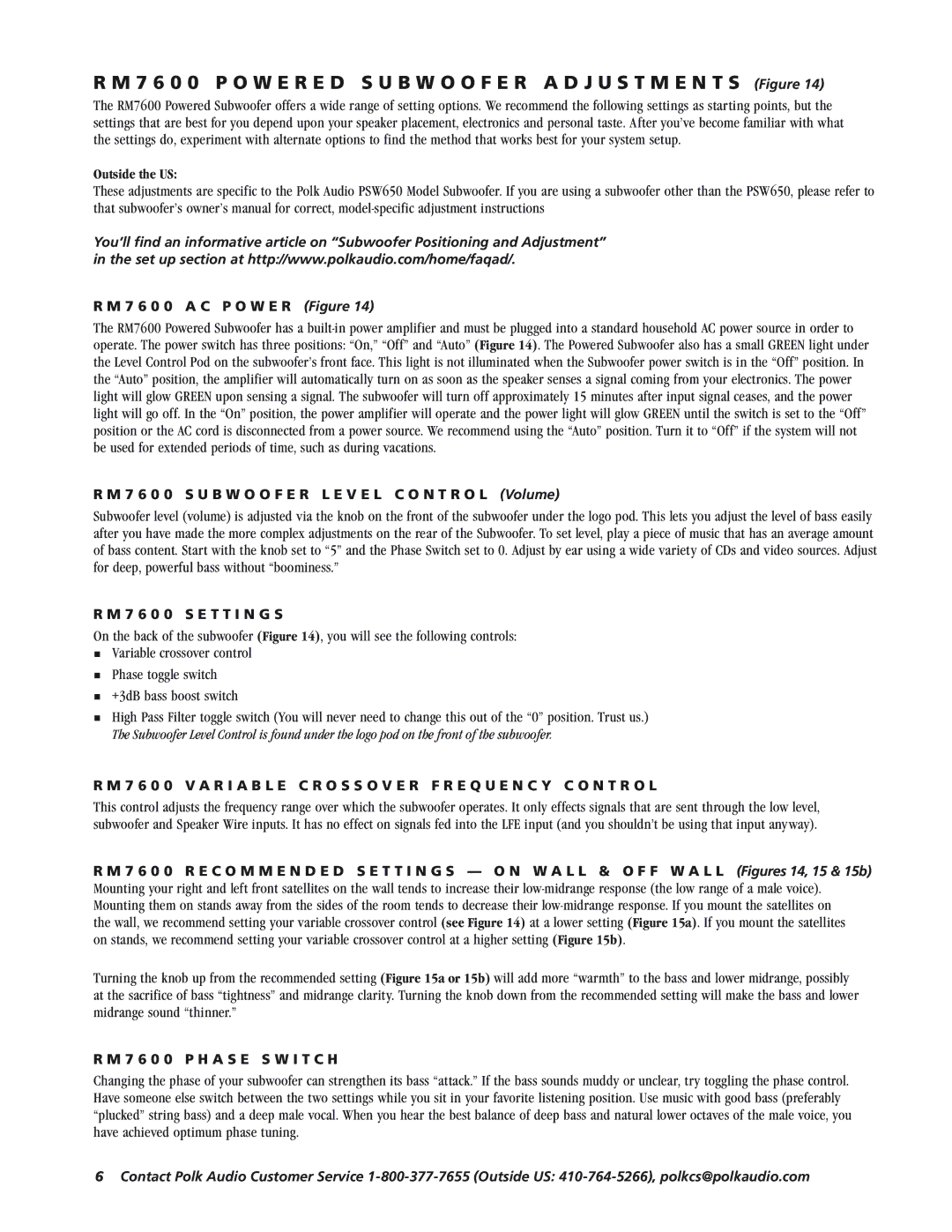R M 7 6 0 0 P O W E R E D S U B W O O F E R A D J U S T M E N T S (Figure 14)
The RM7600 Powered Subwoofer offers a wide range of setting options. We recommend the following settings as starting points, but the settings that are best for you depend upon your speaker placement, electronics and personal taste. After you’ve become familiar with what the settings do, experiment with alternate options to find the method that works best for your system setup.
Outside the US:
These adjustments are specific to the Polk Audio PSW650 Model Subwoofer. If you are using a subwoofer other than the PSW650, please refer to that subwoofer’s owner’s manual for correct,
You’ll find an informative article on “Subwoofer Positioning and Adjustment” in the set up section at http://www.polkaudio.com/home/faqad/.
R M 7 6 0 0 A C P O W E R (Figure 14)
The RM7600 Powered Subwoofer has a
R M 7 6 0 0 S U B W O O F E R L E V E L C O N T R O L (Volume)
Subwoofer level (volume) is adjusted via the knob on the front of the subwoofer under the logo pod. This lets you adjust the level of bass easily after you have made the more complex adjustments on the rear of the Subwoofer. To set level, play a piece of music that has an average amount of bass content. Start with the knob set to “5” and the Phase Switch set to 0. Adjust by ear using a wide variety of CDs and video sources. Adjust for deep, powerful bass without “boominess.”
R M 7 6 0 0 S E T T I N G S
On the back of the subwoofer (Figure 14), you will see the following controls:
Variable crossover control
Phase toggle switch
+3dB bass boost switch
High Pass Filter toggle switch (You will never need to change this out of the “0” position. Trust us.)
The Subwoofer Level Control is found under the logo pod on the front of the subwoofer.
R M 7 6 0 0 V A R I A B L E C R O S S O V E R F R E Q U E N C Y C O N T R O L
This control adjusts the frequency range over which the subwoofer operates. It only effects signals that are sent through the low level, subwoofer and Speaker Wire inputs. It has no effect on signals fed into the LFE input (and you shouldn’t be using that input anyway).
R M 7 6 0 0 R E C O M M E N D E D S E T T I N G S — O N W A L L & O F F W A L L (Figures 14, 15 & 15b)
Mounting your right and left front satellites on the wall tends to increase their
Turning the knob up from the recommended setting (Figure 15a or 15b) will add more “warmth” to the bass and lower midrange, possibly at the sacrifice of bass “tightness” and midrange clarity. Turning the knob down from the recommended setting will make the bass and lower midrange sound “thinner.”
R M 7 6 0 0 P H A S E S W I T C H
Changing the phase of your subwoofer can strengthen its bass “attack.” If the bass sounds muddy or unclear, try toggling the phase control. Have someone else switch between the two settings while you sit in your favorite listening position. Use music with good bass (preferably “plucked” string bass) and a deep male vocal. When you hear the best balance of deep bass and natural lower octaves of the male voice, you have achieved optimum phase tuning.
6Contact Polk Audio Customer Service
